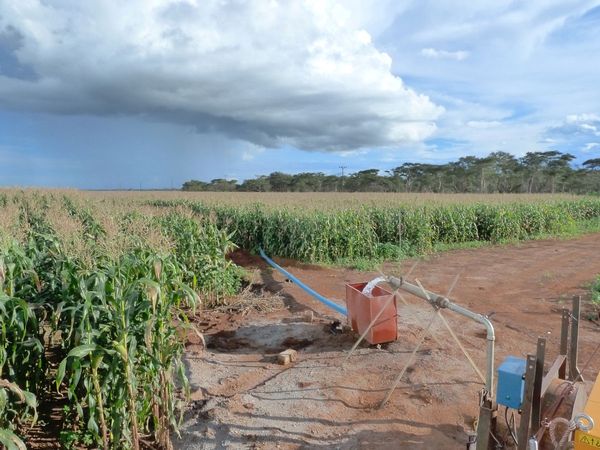
Humans rely on groundwater for many things, but especially our food. Roughly 30 percent of all the planet's available freshwater comes from groundwater, or water that is found underground in the spaces between rocks, soil and sand. It is primarily used for agriculture and billions of humans are dependent on it, facing severe food deprivation without it. A study published this month in Nature Water even details how aquifer depletion also makes it harder to resist historic droughts, such as the record-breaking dry spells unleashed by climate change.
Which makes it pretty alarming that groundwater levels are dropping across the globe, often at increasing rates, as new research in the journal Nature have now estimated the full scope of the problem: Groundwater is on the decline in 71% of the aquifers studied.
The scientists from the University of California, Santa Barbara reviewed nearly 1,700 aquifers all over the planet, including national and subnational records over a century including 300 million water level measurements from 1.5 million wells. Among other things, they learned that rates of groundwater declined aggressively started in the 1980s and 1990s, then became even worse from 2000 to the present. One statistic stands out: The accelerating rates of decline occurred at almost three times the pace that would have happened in the same number of locations if it had occurred by chance.
"We demonstrate that most of the places with accelerated groundwater level declines also had declining rainfall over time," co-author Dr. Scott Jasechko at the Bren School of Environmental Science and Management at the University of California, Santa Barbara told Salon by email. "This finding demonstrates that climate variability and change can impact water supplies underground as well as above-ground."

Jasechko identified a variable in addition to climate change that is causing the groundwater depletion.
"Groundwater is vital to global irrigated agriculture," Jasechko pointed out. "There are places where groundwater pumping for irrigation, to support food production, is leading to groundwater depletion. Our work highlights some relatively rare cases where groundwater depletion has been addressed via interventions, including policy changes and water engineering."
He later added, "Groundwater depletion is a threat to global irrigation. Addressing the groundwater problem can help secure future food production."
This is not to say that climate change should be downplayed as a cause for groundwater depletion. Quite to the contrary: The researchers studied precipitation variability data for 542 aquifers spanning a period of four decades, and found that 90% of those experiencing accelerated declines were in places where conditions have gotten drier. This has probably both increased the demand for water and reduced the actual amount of groundwater available.
At the same time, there can be an occasional silver lining to climate change: When conditions become wetter, groundwater levels can be replenished.
The news isn't all grim, as the authors noted that in 16% of the aquifer systems that suffered groundwater declines in the 1980s and 1990s, the trend was actually reversed. Given that this was only half as common as would have statistically occurred by chance, this statistic does not indicate any larger trend of groundwater restoration — but it does show that certain techniques of restoring groundwater levels can be effective.
The researchers cite as one example the Bangkok basin in Thailand, where groundwater levels fell in the late-twentieth century before shallowing out in the early 21at Century. Experts attribute that reversal to regulations such as licensing of wells and groundwater pumping fees. There is also the Abbas-e-Sharghi basin in Iran, which saw its groundwater levels go up after water was rerouted there from the Kharkeh Dam. Similarly, managed aquifer recharge projects have helped restore aquifer levels west of Tucson, Arizona.
"Some of these cases indicate that aquifers that were heavily exploited before 1980 are recovering," the authors write. "Aquifer recovery can potentially ameliorate the consequences of groundwater pumping (for example, 'land subsidence')."
Yet even the seeming blessing of rising groundwater can prove to be problematic, as they explain: "Rising groundwaters can lead to flooding of coastal cities, waterlogging of farmlands and salinization of groundwaters and soils. Rising groundwater levels maybe driven by reductions in groundwater withdrawals or increases in recharge rates owing to land clearing, irrigation or managed aquifer recharge."
Other research has also painted an alarming picture of human groundwater use. A 2023 study in the journal Geophysical Research Letters found that a tremendous amount of groundwater has been extracted from beneath our feet — more than 2 trillion tons of groundwater between 1993 and 2010, in fact — and that as a result the True North Pole has shifted at a rate of 4.36 centimeters per year (or more than 1.7 inches).
For context, the True North Pole is determined by where our globe's axis of rotation intersects with the surface. This is distinct from the northernmost magnetic pole, which is the point where Earth's magnetic field points vertically downward, although the two locations are relatively close to each other.
The study has "very important practical implications," co-author Dr. Clark R. Wilson, a professor of geological sciences at the University of Texas at Austin, told Salon at the time. "Knowing via measurements from several space geodetic techniques (and also being able to predict in the future) the precise location of the rotation axis within Earth is essential to making the Global Positioning System and other satellite navigation systems work. This is because the rotation axis location is essential to convert the ranges to the GPS satellites into geographical locations on Earth."
As groundwater depletion demonstrates, humans are radically altering our home planet through climate change. Our reliance on groundwater presents a vulnerability for our species, one that could lead to massive suffering in our species' future, especially if we manage it irresponsibly — all while our overheating planet exacerbates the problem.







